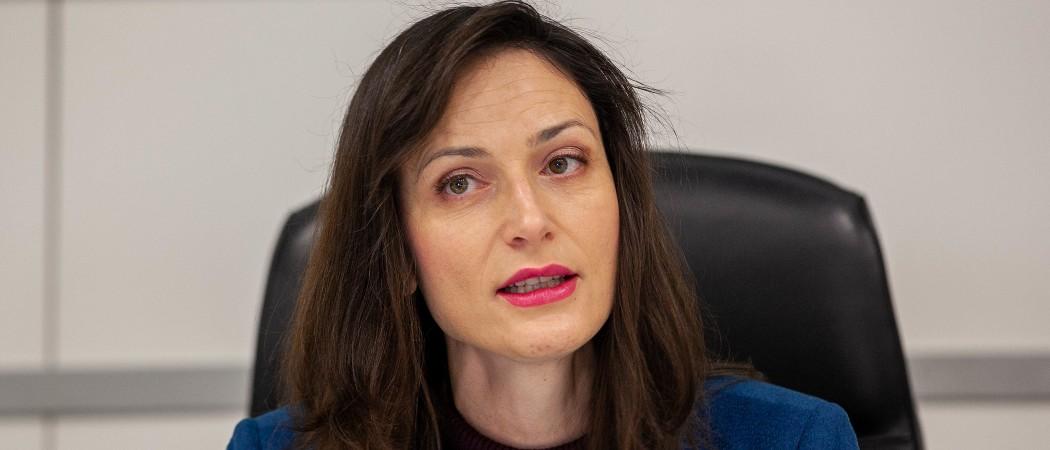As the EU lays plans to use €319B in seized Russian assets to help in the reconstruction of Ukraine, research commissioner Mariya Gabriel stresses the importance of research and innovation in rebuilding the country

EU research commissioner Mariya Gabriel. Photo: European Committee of the Regions / Flickr
After fast tracking Ukraine into the Horizon Europe club – at no cost – the Commission is now shaping initiatives to help repair damage to the research infrastructure caused by Russian bombs and to help scientists who remained in the country and are doggedly carrying on with their work.
“We strived to act fast and respond immediately to the country’s key needs and adapt to the changing context,” EU research and innovation commissioner Mariya Gabriel told Science|Business. “Recently, our attention has shifted to support those who remain in the country and have insufficient resources to continue working.”
Gabriel said one of the ways the Commission is helping is in pulling the country closer to the EU’s research ecosystem by encouraging its researchers to participate in Horizon Europe and the Euratom nuclear fission and fusion research programme. That’s why the Commission waived Horizon Europe participation costs for Ukraine, which as an associated country would usually be paying to take part.
The Commission is also laying plans to help Ukraine prepare for its eventual reconstruction. In the upcoming Horizon Europe work programme for the next two years, there will be money for projects in the areas of research infrastructures, climate neutral cities and nuclear safety and security.
Perhaps more significantly in cash terms, the Commission is said to have been instrumental in ensuring the restoration of the research system is written into the country’ overall recovery plans.
Today, the Commission published initial proposals to invest seized Russian assets and use the proceeds to help Ukraine.
In total, the Commission and member states have frozen €19 billion of assets belonging to Russian oligarchs, while round €300 billion of Russian Central Bank reserves are blocked in the EU and other G7 partners.
To make the most of these funds and to start rebuilding Ukraine now, the Commission is proposing in the short-term to set up a structure to manage the frozen public funds, invest them and use the proceeds in favour of Ukraine.
In the long-term and once the sanctions are lifted, the Central Bank assets will need to be returned. However, the Commission says this could be linked to a peace agreement, which compensates Ukraine for the damages it has suffered. Assets that are returned could be offset against this war reparation.
Gabriel promised she will remain vocal about the importance of research and innovation in the reconstruction of Ukraine, in the EU’s plans and beyond. “It would be essential to secure an appropriate share of funding for the research and innovation ecosystem in the forthcoming multi-billion dedicated financial and technical assistance, both at EU and global levels,” said Gabriel. “While more immediate priorities are understandably at the fore now, we should not overlook the importance of R&I and the R&I ecosystem in Ukraine. It will be key in rebuilding a modern Ukraine and returning the intellectual assets to the country.”
The Commission’s voice does carry weight in this respect. It has already done a lot to have research and education included in Ukraine’s draft post-war recovery plans, Olga Polotska, executive director of the National Research Foundation of Ukraine, recently told Science|Business.
Destruction and displacement
Many schemes set up immediately after Russia invaded Ukraine in February, including EU-funded ones, were to help out refugee scientists, and there’s been more hesitancy around putting money into remote scholarships and action to prevent brain drain.
Gabriel said the Commission is not naïve about the dangers of scientific knowledge generated in Ukraine being subverted. The EU is working with the Science and Technology Centre of Ukraine to ensure no dual-use knowledge from Ukraine travels to ‘malevolent states.’ This intergovernmental body was set up in the 1990s to enable scientists from the former Soviet states to transition to civilian research, and to ensure the non-proliferation of nuclear, biological and chemical weaponry, and it continues to do so, Gabriel said.
With at least 15% of Ukraine’s research infrastructure destroyed by Russian shelling and thousands of scientists displaced and unable to work, the country’s research community is in urgent need of support on the ground.
Since spring, Ukrainians have been vocal about supporting the many scientists who stayed. The working conditions in the country are dire - and getting worse - as Russia continues to bomb civilian infrastructure and power grids, and there are fears the brightest minds will leave the country for good. Ukraine’s deputy research minister Andrii Vitrenko reiterated the need for support for the country’s research community at a recent meeting with the Commission in Brussels.
Following on from that meeting, Gabriel said as a next step the Commission is exploring setting up a Horizon Europe Office in Kyiv in the course of 2023. [“This] could have a multiplier effect on Ukraine’s participation in the programme: to strengthen academic and business networks, and to provide support in the preparation of more competitive applications from Ukraine,” she said.
Thus far, Ukrainian scientists are persevering, and their participation in EU’s research schemes has not dipped. “For the time being, it is encouraging to see that Ukraine’s participation in the Horizon Europe and Euratom programmes is comparable to pre-war levels,” says Gabriel.





 A unique international forum for public research organisations and companies to connect their external engagement with strategic interests around their R&D system.
A unique international forum for public research organisations and companies to connect their external engagement with strategic interests around their R&D system.